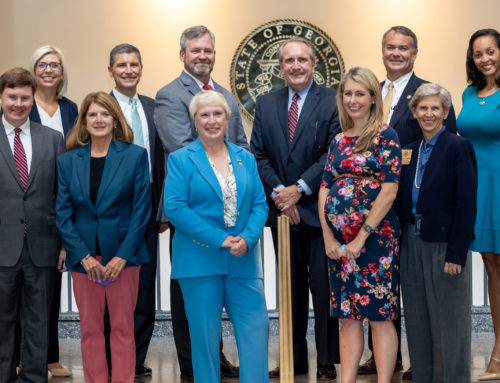Georgia Commissions on Dispute Resolution and Family Violence Collaborate on new Rules for Mediating Cases Involving Domestic Violence
Atlanta, GA — Following two years of concerted effort, the Georgia Commission on Dispute Resolution (GCDR) has adopted new Rules for Mediating Cases with Domestic Violence. These rules will be used by court Alternative Dispute to screen cases for intimate partner violence/abuse (domestic violence) in domestic relations cases.

(L-R) Judge Charles E. Auslander, III; Raye Rawls; Joan Prittie; Judge M. Cindy
Morris; Tracy B. Johnson; Stephanie Woodard; Peggy Wilson; and Jennifer Thomas
The GCDR requires that these sensitive cases be carefully screened by especially skilled mediation court staff to determine whether the case should proceed to mediation, and, if appropriate, that the case be mediated only by state-registered mediators who have demonstrated proficiency in both practice and training.
The safety of victims of domestic violence is the GCDR’s highest priority. The new Rules specifically exclude any case from mediation that arises under the Family Violence Act, such as a Petition for a Protective Order, and exclude any criminal cases that involve allegations of family violence.
Collaboration, a cornerstone technique in mediation, played an important role in developing informed rules appropriate for present day. The Georgia Commission on Family Violence (GCFV) has endorsed the Rules and is committed to supporting a joint committee with the Commission on Dispute Resolution to oversee implementation, training, review, and revision of the Rules. “The thoughtful consideration and work put forth by the Commission on Dispute Resolution in updating the Rules for Mediation in Cases Involving Issues of Domestic Violence marks a meaningful change for victims of intimate partner violence,” said GCFV chair Stephanie Woodard. “These changes mean access to a safe, informed, and prepared mediation process for families who are seeking safety and independence. Instead of theoretical questions or judgments about why victims do not leave unhealthy relationships, the professionals of the Commission put their best work product into changes that allow a safe avenue to do so. On behalf of victims of intimate partner violence, we are thankful for this movement forward.”
At a recent GCDR meeting, Chair Charles E. Auslander, III, praised the work of both Commissions. “When two Commissions are able to work together, it makes for a unique partnership. I have always had great respect for the Commission on Family Violence; to see the work that they do is unbelievable. It is the first time that two commissions have worked so closely together on a project, which is a true credit to all of the people involved who want a great product that protects the safety of all involved, allows the parties self-determination, and utilizes best practices but still can be as practical for implementation by the [court ADR] programs. We are thankful that we were able to partner with a group with the expertise and passion of the Commission on Family Violence which is composed of state leaders dedicated to protecting victims and ensuring they have a voice.”
The current guidelines, first adopted in 1994 and amended in 2003 and 2005, have been updated to ensure best practices are used based upon the latest research and practices in the fields of mediation and intimate partner violence/abuse. At their August 22 meeting, the Commission on Dispute Resolution voted to both repeal the old guidelines for mediating cases with domestic violence and enact the new Rules for Mediating Cases with Domestic Violence. The new Rules are effective January 1, 2021.
244 Washington Street SW Suite 300 Atlanta, GA 30334
404-656-5171 | georgiacourts.gov
Twitter: @gacourts Facebook: www.facebook.com/gacourts





